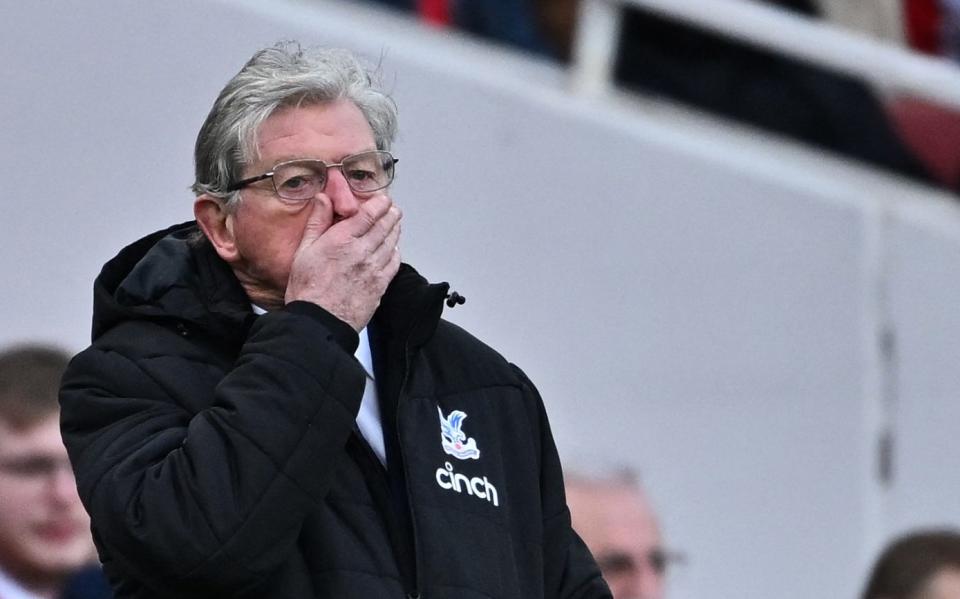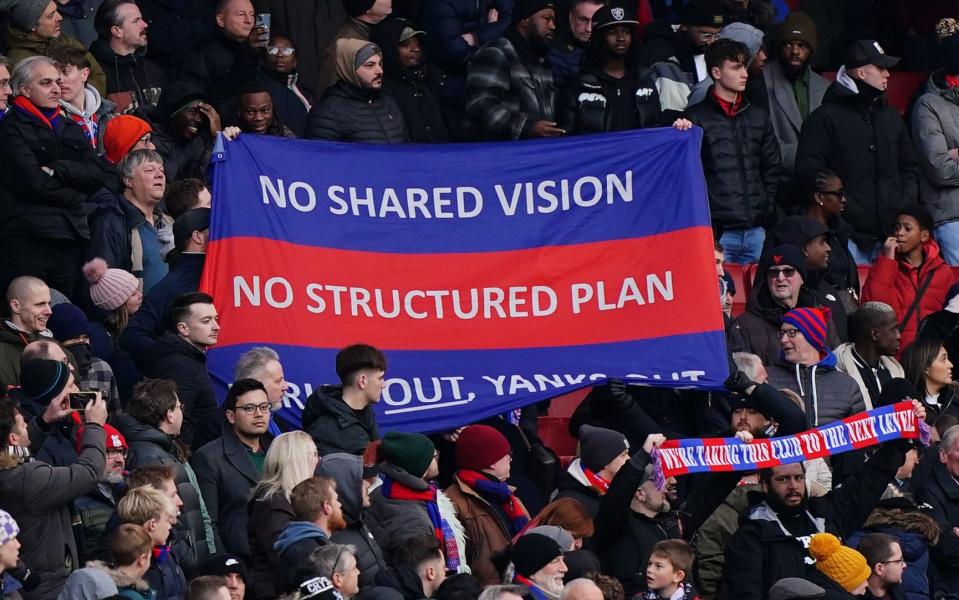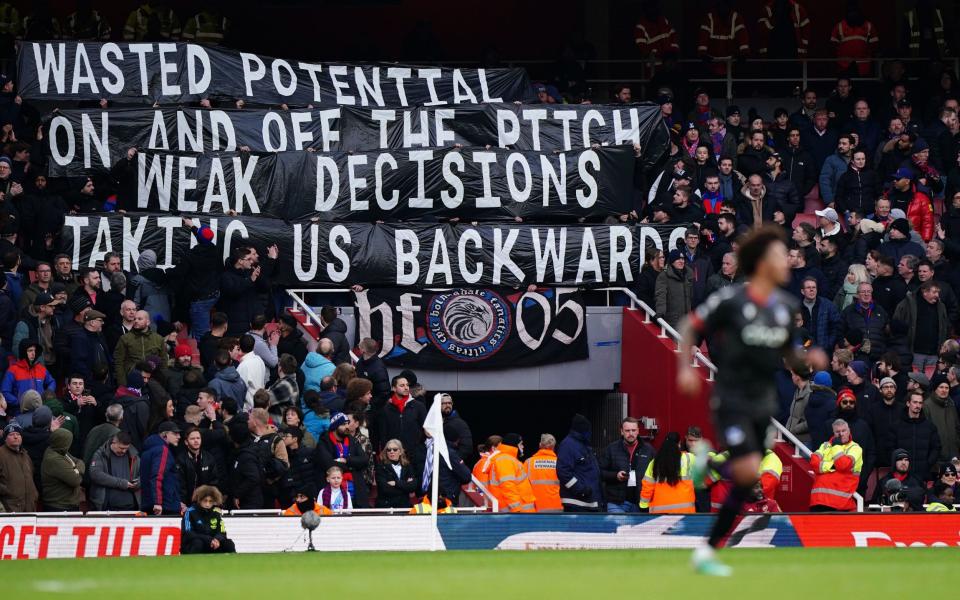Roy Hodgson knows his job at Crystal Palace is under pressure

Roy Hodgson conceded that his job is under pressure after Crystal Palace crashed to a 5-0 defeat at Arsenal amid fan protests against the ownership in the away end.
Hodgson, 76, has steered Palace to safety or better in five of their club-record 10-season stay in the Premier League, but the scale of this defeat and the current run have inevitably raised questions. Banners from disgruntled Palace fans about “wasted potential” and “weak decisions” raised the temperature for chairman Steve Parish and fellow owners while Hodgson admitted that a manager was always vulnerable.


Hodgson has said that this will be his last season in a 48-year management career, having returned last March when Patrick Vieira’s side got into relegation trouble. Against that backdrop, Steve Cooper is now available as well as other contenders to replace Hodgson.
They include Julen Lopetegui, most recently of Wolverhampton Wanderers; Bo Svensson, a Danish coach most recently in charge of Bundesliga side Mainz; and Ipswich Town manager Kieran McKenna.
The former Chelsea and Brighton manager Graham Potter was in a hospitality suite in the stadium with his two children but is not thought to be an immediate contender for the Palace job. He is still of interest to Manchester United if they decide to make a change in the summer.
Asked about the fan protests, Hodgson said that it was always the manager held ultimately responsible. He said: “It’s part and parcel of football and always has been. These days when staying in the Premier League is so important, and relegation is such a fear, that type of situation might come around a bit quicker than it might have done years ago. But nothing has changed since I came back to England in 2008 – the fact is when a team is not doing as well as it should, someone needs to be held responsible and that is always the manager.”
Asked directly whether he felt he had the backing of the Palace ownership, principally Parish; the US investors Josh Harris and David Blitzer; and Eagle Football led by another US investor, John Textor, Hodgson said that was not a question he could answer.
“Well that’s a question for them isn’t it?” he said. “If you’re asking me, ‘Have I ever felt there is a lack of support from them?’ No, I haven’t, they have been good. Now in the scenario you are envisaging that has to be a question for them.”
Hodgson used to be the solution – now he’s part of the problem
As he stood in the dugout at the end of Crystal Palace’s humiliating 5-0 defeat at Arsenal, waiting for his players to trudge slowly off the pitch, Roy Hodgson carried the look of a man who knew it was over. There was a streak of pain across his face, the realisation that most careers, no matter how extensive, no matter how resilient, no matter how high their peaks, end in failure.
For sure, there have been several occasions before when the great survivor has bade farewell. There have been departure press conferences at Watford and Crystal Palace, when the assumption was that he was going to spend more time with his memories, not to mention catching up on his reading of the great American novel canon. Every time before, after saying he was off, the Frank Sinatra of management has bounced back, surprising everyone by his refusal to yield to chronology. For Roy 76 has long been the new 50.
This time, though, the omens are dark. This time it looks as though the end has finally been reached. At the end of this match, for all his press conference insistence on fighting on and working hard on the training pitch, he had the bearing of a man going through the motions.
Because in a game for which he needed his team to buckle down and respond, Hodgson was undermined from the kick off. As Arsenal systematically bullied, then toyed them into submission, Palace’s players hardly represented a bunch playing for their manager. There was no fight, no fire, no resilience. Never mind, the excellent Eberechi Eze apart, absolutely no creativity.
Hodgson, a man who has built a reputation on his organisation, on the rigidity of his defence, must have watched in pain as Arsenal – with George Graham in attendance – turned back the years and went oldschool at corners to score twice in the first half. On both occasions, his team resembled a damp paper bag, his centrebacks out-muscled, his goalkeeper, Dean Henderson, making Andre Onana look a model of resilience. He might have complained afterwards that his players felt they had been obstructed, but at the time, as he stood in the technical area, static, quiet, barely responding, his body language exuded defeat.
Watching from the directors box as the Arsenal goals kept coming, the Palace chairman Steve Parish was seen rapidly keying a message into his mobile phone. Moments later, elsewhere in the stadium, Graham Potter, watching on with his children, was filmed consulting his own phone, as if the two were in direct communication. It was a fanciful thought: Potter has higher ambitions than are available at Selhurst. Besides, Parish knows the best way to placate an increasingly despondent fanbase hardly lies in the direction of a former Brighton manager.
Not that the Palace supporters’ disquiet was directed at Hodgson. Even if things are growing distinctly uncomfortable in terms of league position, he has delivered far too much over the years to be blamed by followers who have much to be grateful for. Rather, the target of some direct and forceful criticism from the Palace section was Parish and his fellow board members. “No shared vision. No structured plans,” read a series of banners held up as the fourth Arsenal goal was registered. “Wasted potential on and off the pitch. Weak decisions taking us backwards.”
Crystal Palace fans let their feelings known... 😡
📺 TNT Sports & @discoveryplusUK pic.twitter.com/tb3H5wJ5lW— Football on TNT Sports (@footballontnt) January 20, 2024
Freeform verse is not a common sight at football stadiums. But the point was clear: change is needed at Selhurst. And for Parish, the easiest and simplest way to get some zest back into the operation is to dispense with the man on whom he has so often called to firefight crises in the past.
Hodgson is not one to register complaint. If anyone does, he knows the score. And when it is 5-0, he is in no position to argue.
“I’ve been working in these modern times,” he said. “The fact is if a team isn’t doing as well as it should be doing someone needs to be held responsible. And that’s usually the manager.”
At Palace in the past when things have been going wrong, when the team is struggling, they have known what to do. They have called in Roy Hodgson. This time, that solution is not available. What happens next is intriguing indeed.

 Yahoo Sports
Yahoo Sports 
